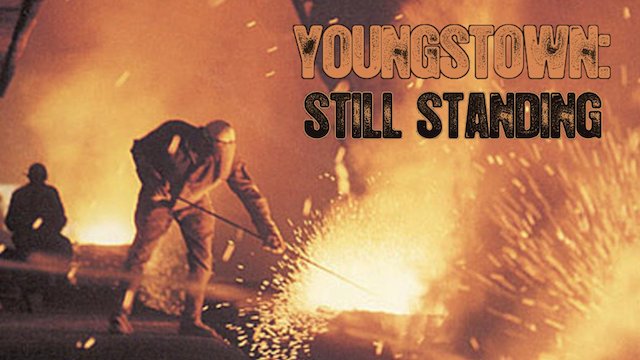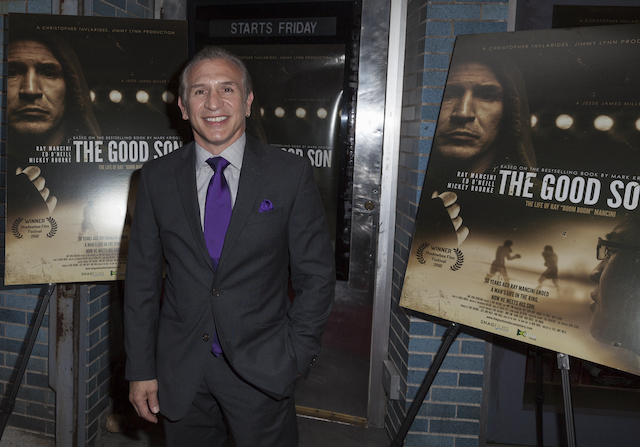
After a brief-but-stellar career in prizefighting, Ray “Boom Boom” Mancini has found satisfaction and success as a movie producer, winemaker, philanthropist and family man as well as Youngstown, Ohio’s, biggest booster.
The world knows Ray “Boom Boom” Mancini as the formidable boxer with the charming personality who became a World Boxing Association lightweight champion at age 20.
But boxing was simply one chapter of his life, and everything that has come after — family, acting, film production and philanthropy — has been just as satisfying and rewarding, the 63-year-old says.
Throughout it all, Mancini has always been mindful of his role in the spotlight as representative of his hometown of Youngstown, Ohio, where he moved back in 2014 after spending 30 years in California.
“When you win a world title, you have an obligation, not just to your family and your friends but also to the city, to go out and represent them in the best possible way,” he says. “I hope I have done that.”
Honoring his father
Growing up, all Mancini dreamed of was winning a boxing world championship title. There is even a baby photo of him in a bassinet with tiny boxing gloves on his hands.
His father, Lenny Mancini, was a talented boxer who had to give up a shot at the championship title when he was drafted in 1941. The youngest of his three children, Mancini grew up wanting to emulate his father. “He was everything I wanted to be — as a man, as a husband, as a father and as a fighter,” he says.
His father tried to steer him toward other opportunities, not wanting his son to work as hard as he had to. A natural athlete, Mancini did have other options. His high school football coach told him he could earn a college scholarship, and a local baseball scout offered him a minor league contract with the Toronto Blue Jays. Still, Mancini was singularly focused on pursuing a boxing career.
“People ask me, ‘If you weren’t a fighter, what would you have done?’” he says. “I can’t answer that, because there was nothing else I wanted to be.”
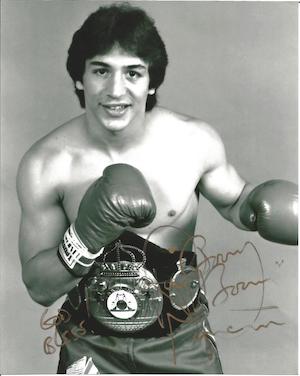 After training and fighting at a local gym, Mancini made a name for himself in Golden Gloves tournaments, winning local and regional titles in high school. He then signed with manager Dave Wolf and moved to New York City in 1979.
After training and fighting at a local gym, Mancini made a name for himself in Golden Gloves tournaments, winning local and regional titles in high school. He then signed with manager Dave Wolf and moved to New York City in 1979.
While his father had a “brawler” boxing style — always advancing on his opponent — Mancini’s was more pragmatic. “My father would say, ‘I never took a backward step, but sometimes I wish I did. You need to be more scientific. You don’t have to make it a war if you don’t have to.’”
Within six months of his arrival in the Big Apple, Mancini was 8-0. In May 1981, he beat Jorge Morales to win the North American Boxing Federation lightweight title. A year later, in May 1982, he achieved his dream: He won the World Boxing Association lightweight title by defeating Arturo Frias on a technical knockout.
“People say to me, ‘Can you explain what that’s like?’ and I say, ‘No, I can’t,’” Mancini says of scaling that highest peak. “It was like an out-of-body experience. It’s a euphoric feeling. I only experienced that three other times, when each of my children were born.”
Mancini has three children with his first wife, Carmen Consuelo Vazquez: Leonardo, named after Mancini’s father; Raymond Jr.; and Carmenina, known as “Nina,” named after her mother. All three speak Italian and Spanish, and his daughter obtained Italian citizenship through her grandfather, he says proudly. He also has a 4-year-old granddaughter, Layla.
Tragedy strikes
A defining moment in Mancini’s life came in November 1982, when a 14-round fight with Duk-Koo Kim ended in a technical knockout. Kim never regained consciousness and died four days later. Kim’s mother committed suicide four months after her son’s death. The fight’s referee, Richard Green, killed himself a few months after.
“It was heartbreaking,” Mancini recalls. Later, Green’s daughter told him her father suffered from depression, he adds.
So how did Mancini cope emotionally with such a load? By grieving, mourning and eventually moving on, because, well, there is no other choice, he says. That’s also how he dealt with the pain of losing his older brother, Lenny (who died in a mysterious shooting in 1981), he says.
A turning point came in 2011, when Mancini met Kim’s fiancée and son, thanks to writer Mark Kriegel, who’d gone to South Korea to interview them for a book he wrote about Mancini’s life. “It was important for them, and it was important for me, too,” Mancini recalls of the meeting. “I hugged them and I told them how sorry I was.”
Kim’s death had a profound impact on Mancini’s love for boxing. “Before the Kim fight, I fought because I loved the sport,” he explains. “I loved being a fighter. I loved everything about it. But after that fight, the passion and the love was gone.”
He considered retiring, so he prayed about it and asked for counsel from his close friend and former teacher, the late Rev. Tim O’Neill, who encouraged him to continue his journey as world champion. He decided to do that, but boxing became just a way to earn an income, Mancini says.
Mancini ended up retiring young. He lost his WBA lightweight title in 1984 to Livingstone Bramble and retired the following year at 24 after losing their rematch by one point. “Once my business manager told me that I was set, that I was financially secure, that’s when I walked away,” he says. “Fighting was one part of my life, one chapter, but I knew there were other chapters to be written.”
He did step into the ring again twice, but lost both fights. One was in 1989 against Hector “Macho” Camacho for the World Boxing Organization light welterweight title, and the other in 1992 against Greg Haugen for the NABF light welterweight title.
His final career record was 29 wins and 5 losses.
A life in Hollywood
Having taken parts in off-Broadway plays, Mancini moved to Los Angeles to pursue a career in acting and film production.
He has appeared in several films, including the 1994 comedy “The Search for One-eye Jimmy,” the 2002 drama “Turn of Faith,” the 2008 martial arts film “Redbelt” and the 2017 thriller “Bad Frank.” He also heads Champion Pictures, an independent film company, and Boom Boom Productions, an independent TV company.
He’s especially proud of producing the 1999 remake of “Body and Soul,” in which he played the lead role of Charlie Davis, a small-town boxer whose morality is challenged but eventually prevails. The original 1947 film featured John Garfield, a favorite actor of Mancini’s who he was told he resembled. “It took me 10 years to acquire the rights to that,” he says. “The original is one of the best boxing films of all time.”
Mancini also produced the well-received documentary “Youngstown: Still Standing” in 2010, which premiered at the Cleveland International Film Festival.
He was the subject of the 2012 documentary “The Good Son: The Life of Ray “Boom Boom” Mancini” and a 2013 biography of the same name.
He’s currently producing a thriller set in the world of electronic dance music, or EDM, that he describes as “‘Saturday Night Fever’ meets ‘The Sopranos’.” His daughter is a huge fan of EDM, a music genre he’s come to appreciate, he explains. Another project he hopes to achieve is establishing a full digital-media studio in Youngstown.
Mancini also owns the wine company Southpaw (a reference to “mancino,” which in Italian means “left-handed”) and collaborated on the production of Boom Boom Bourbon with Cleveland Whiskey and Ringside Whiskey.
Return to his roots
He and his second wife, Tina Rozzi, knew each other in their youth and reconnected in 2006 after marrying and divorcing around the same time. They got married in 2014 on the beach in California, and shortly after moved back to Youngstown.
“It’s funny how stuff happens and comes full circle,” Mancini says. “Here I am, living back in Youngstown and marrying a Youngstown girl. … Who would have thunk it.”
A major part of his life in Youngstown is the nonprofit Ray “Boom Boom” Mancini Foundation, which he established in 2015 to raise funds for organizations that serve children, the elderly, first responders and veterans who experience physical and financial difficulties. “I had done a lot of appearances for other people’s foundations, and I thought, ‘I’d like to try to do that in my hometown. I know a lot of people who could use the help back home,’” he says about starting his own philanthropic enterprise.
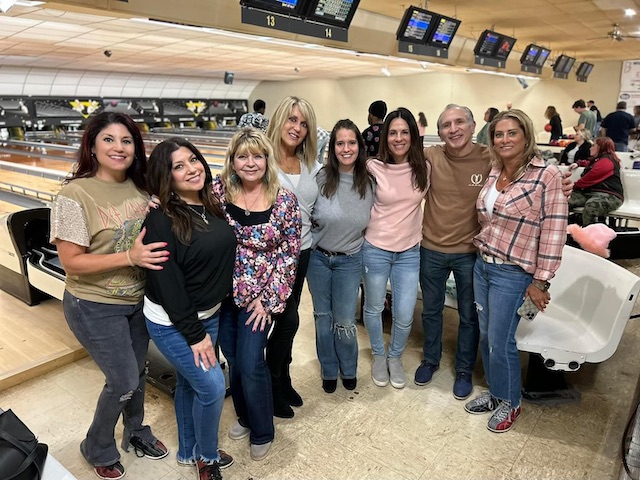
Most recently, the foundation was planning a “fight night,” likely in November, to benefit veterans’ organizations, says Mancini, who is an honorary board member of the National Veterans Foundation along with figures such as Bob Hope, Burt Reynolds and Martin Sheen. “Veterans are the forgotten sector of our society,” he says, pointing to the disproportionately high rates of homelessness and addiction among veterans. “It’s astonishing to find out how little the government does for our vets when they get home.”
He’s a regular presence on the Youngstown airwaves, hosting an entertainment and lifestyle segment from 5 to 6 p.m. every Thursday on WBBW-AM, titled “The Boom Boom Room.”
Mancini is a 1994 inductee into the National Italian American Sports Hall of Fame and is a perennial presence and guest of honor at the organization’s fight nights, golf outings and galas. In 2021, NIASHF named its fight night in his honor.
“Ray is one of the most supportive inductees in our hall. He has a burning desire to keep Italian heritage and traditions alive,” NIASHF President Ron Onesti says. “He’s also one of the most unselfish celebrities I’ve worked with. He’s always willing to stop and say ‘Hi’ and take a picture, but every time he meets a young boxer, he’s never shy about giving tips.”
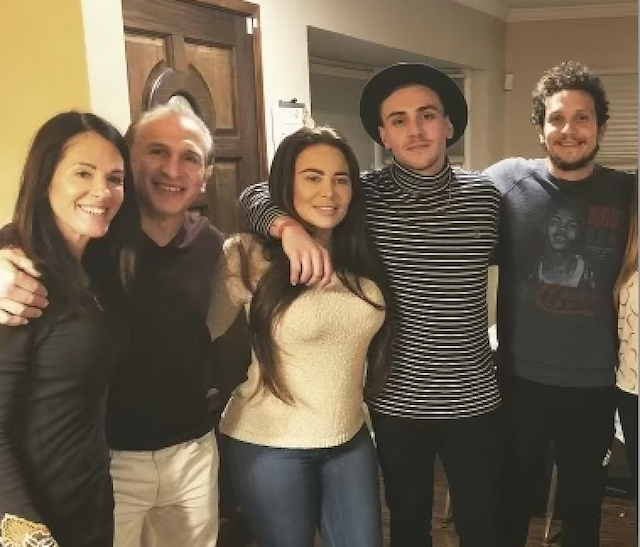
Nowadays, Mancini, who holds a purple belt in jujitsu, stays fit by working out half an hour a day with 10 minutes of cardio and 20 minutes of strength training.
“At age 52 I went to the doctor, and he said, ‘You’ve got to work smarter, not harder.’ That’s my new mantra. Consistency and intensity is the key. Everything is maintenance,” he says. “I am not getting ready for no world-class event,” he adds, laughing.
This year, Mancini gave his third high school commencement speech in Youngstown. His message to graduating students? “Take shots in life.”
“If you miss, so what? You move forward,” he says. “But don’t live life with regrets. Do not be afraid. The only shots I regret are the ones I haven’t taken. Take shots, so you don’t have to live with the ‘what if.’ I am fortunate I don’t have to. That’s what I am proud of.”
“I miss more than I hit, trust me,” he adds. “But the ones I hit have been pretty good.”
The above appears in the July 2024 issue of the print version of Fra Noi. Our gorgeous, monthly magazine contains a veritable feast of news and views, profiles and features, entertainment and culture. To subscribe, click here.
 Fra Noi Embrace Your Inner Italian
Fra Noi Embrace Your Inner Italian


